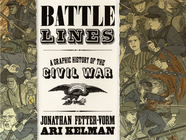I confess that I have never been deeply interested in The American Civil War. After reading this book, I’m convinced that the only reason I wasn’t interested is because of how the topic was presented to me. I am now very interested.

Battle Lines: A Graphic History of the Civil War takes the history and scholarship surrounding the conflict which shaped the United States and which still has an impact on its internal politics and struggles and adds what was always missing for me: the human element. Each chapter takes an ordinary, everyday object from the era and uses that object to begin a vignette that demonstrates how the war affected real people. We are given solid history, but within a context that gives the facts meaning. As Jonathan Fetter-Vorm did with Trinity: A Graphic History of the First Atomic Bomb, a difficult and complex topic is deftly broken down into easily digestible portions along with a moving and real sense of why I as a reader should care.
The artwork in the book is powerful and evocative. The narrative is cinematic. It is not hyperbole to say that I was transported into the story while reading, to the extent that I often forgot I was reading; I was so moved with emotion that more than once I found myself in tears. Combine this with the solid presentation of historical facts and I am left with a hunger to know more. For this, I say this book belongs in every school library in the country and on the shelf of anyone interested in good art, excellent storytelling, and careful scholarship.
Disclosure: I was given my copy of this book by the publisher as a review copy. See also: Are All Book Reviews Positive?
It seems that the writer of the above small article has the same problem as many current day historians: they think that the common man was important in history. Reality is that no common man was important. Only rulers and men with power were. The life, death, suffering, thoughts, culture nor wisdom of Joe Blogs has had an influence on history.
I suppose my perspective is based on my belief that every person has inherent value, regardless of whether they have power, money, influence, the right equipment, the right perspective, or anything else.